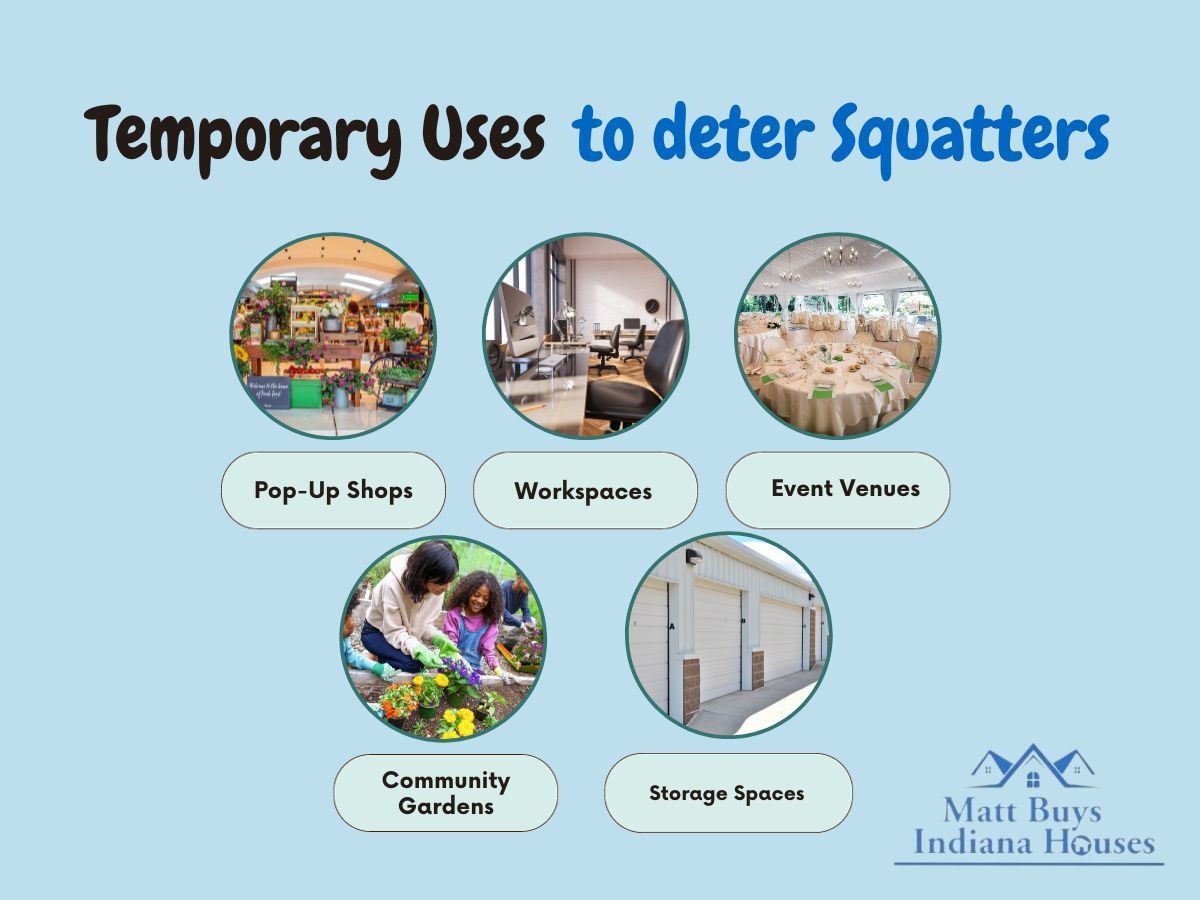Creative Ways To Get Rid of Squatters
September 14, 2023
In the world of property ownership, one often overlooked challenge is dealing with unauthorized occupants or squatters. While the concept of squatting is not new, its modern manifestations require property owners to think outside the box.
Beyond the traditional legal remedies, there are a plethora of innovative strategies to address this issue. This article delves into 11 creative ways to deter squatters, blending preventive measures with proactive solutions ensuring property owners can reclaim and protect their spaces while fostering positive community relations.
1. Open Communication
Open communication is the cornerstone of understanding and resolving many conflicts involving squatters. When property owners discover unauthorized occupants, the immediate reaction might be frustration, anger, or even fear.
However, initiating a dialogue can often lead to a more peaceful and quicker resolution than immediately resorting to legal action or confrontation. Here's a deeper dive into why and how open communication can be effective:
- Approach squatters with empathy and a desire to understand their perspective.
- Maintain a calm and respectful demeanor, avoiding confrontations.
- Consider mediation if direct talks don't yield results.
- Document interactions for future reference.
- Clearly state your position as a property owner and set boundaries.
By initiating open communication, property owners can reach mutual agreements, ensure a peaceful departure, or gain legal clarity if the situation escalates.
2. Offer Assistance
If the squatters face financial or personal difficulties, consider offering assistance in finding shelter or connecting them with local social services. This approach not only helps the squatters but also ensures a peaceful transition.
The key points include:
- Many squatters face underlying issues like homelessness or financial difficulties. Addressing these root causes can resolve the squatting situation.
- Providing assistance fosters goodwill, making it more likely for squatters to cooperate.
- A compassionate approach can positively impact the property owner's community reputation.
- Assistance can take various forms, including referrals to social services, temporary housing solutions, employment opportunities, legal aid, or mediation services.
- Potential outcomes of this approach include voluntary vacating of the property, improved relations, and increased community support.
In essence, offering assistance can lead to a peaceful resolution while benefiting the property owner and the community.

3. Mediation
Mediation, an alternative dispute resolution method, involves a neutral third party helping conflicting parties reach a mutually satisfactory agreement. In the context of squatter situations, mediation can serve as a bridge between property owners and unauthorized occupants, fostering understanding and facilitating resolution.
Engage a neutral third party to mediate between you and the squatters. This person can help both parties come to a mutual agreement, which might involve the squatters leaving the property by a specific date or under certain conditions.
4. Temporary Leasing
In situations where property owners confront squatters, one innovative solution is the concept of temporary leasing. This approach involves legally allowing the squatter to reside on the property for a predetermined period.
If you're not hurrying to use or sell the property, consider drafting a short-term lease for the squatters. This can provide them with a legal way to stay for a specified period while also ensuring they maintain the property. Once the lease ends, they would be legally obligated to leave.
5. Security Measures
Enhancing the security of a property is a subtle yet effective means of discouraging unauthorized occupancy. Here's how:
- Security Cameras: Visible cameras act as a deterrent, as squatters often prefer places where their activities can go unnoticed. Modern cameras, equipped with motion detection and night vision, can record activities around the clock, ensuring that you always have evidence should there be any unauthorized entry or suspicious activity.
- Alarm Systems: Alarms can be set up at entry points like doors and windows. An audible alarm can draw attention, potentially scaring off intruders. Silent alarms, on the other hand, can alert property owners or security services without informing the intruder.
- Security Personnel: While hiring security might be an investment, their presence can strongly deter potential squatters. It sends a clear message that the property is being monitored and that unauthorized activities will be noticed.
However, it's crucial to strike a balance. While security measures are put in place to protect property, they should not be used as a means of intimidation or threats towards squatters or any other individuals. The key is to make the property less appealing to squat in, not to create a hostile environment.
As always, the emphasis should be on ensuring safety, respect, and legality in all actions.
6. Legal Notices
Property owners should prominently display "No Trespassing" and "Private Property" signs to establish clear boundaries and deter unauthorized occupancy.
This makes it clear that unauthorized occupation is not allowed. If squatters are already present, serve them with an eviction notice.
While this isn't exactly "creative," it's a necessary step in many jurisdictions before taking further legal action.
If squatters are already on the property, serving an eviction notice is crucial, as it informs them of their illegal status and is often required before pursuing further legal action in many jurisdictions.
7. Engage the Community
Involve neighbors and the wider community to enhance property security. Implementing or joining neighborhood watch programs, encouraging neighbors to report suspicious activities, and organizing community meetings about squatting can foster collective vigilance.
A unified community acts as a strong deterrent against unauthorized occupancy and promotes a safer, more cohesive neighborhood environment
8. Cultural or Community Events
Hosting frequent events, ranging from art showcases and cultural festivals to community classes, can deter squatters by keeping a property consistently active.
By turning a property into a lively community hub, it becomes less appealing for unauthorized occupancy while simultaneously enriching local culture and fostering community ties.
9. Temporary Uses
Leveraging your property for short-term activities can deter squatters by signaling consistent activity and use. Here are ways to consider:
- Pop-Up Shops: Allow local vendors or artists to set up temporary stalls or shops. This not only keeps the property bustling with activity but can also foster local businesses.
- Workspaces: Convert spaces into short-term coworking areas. The influx of entrepreneurs and freelancers can ensure regular footfall and maintain a sense of occupancy.
- Event Venues: Rent out the property for events such as weddings, corporate gatherings, or workshops. A frequent turnover of events can keep the property occupied most days.
- Community Gardens: If the property has open spaces, consider setting up community gardens. Local residents can cultivate small plots, ensuring consistent visits and maintenance.
- Storage Spaces: Offering the property as a temporary storage solution for local businesses or residents can ensure it remains locked and in use, deterring potential squatters.
A property owner can ensure the space doesn't remain idle by actively engaging in temporary uses. These consistent activities prevent unauthorized occupation and generate some revenue or goodwill within the community

10. Collaborate with Local Authorities
Engaging with local government and law enforcement is pivotal in preventing squatting. This involves regularly reporting suspicious activities, requesting safety inspections, partnering on awareness campaigns, seeking guidance on property protection, and participating in community policing initiatives.
Such collaboration enhances property security and fosters a harmonious relationship between property owners, the community, and authorities.
11. Legal Action
When preventive measures against squatting fall short, legal action becomes essential. It's crucial to thoroughly document all squatter-related incidents, engage with a specialized attorney, and serve formal eviction notices. If squatters persist, initiating a lawsuit may be necessary.
Additionally, owners can seek restitution for damages and should stay informed about local laws concerning squatter rights.
Although potentially time-consuming, legal proceedings offer a conclusive resolution and emphasize the significance of property rights.
Final Words
Property ownership brings with it not only the joy of having a personal or investment space but also the responsibility of safeguarding it. In the face of the modern challenge posed by squatters, it's paramount for property owners to be proactive, innovative, and informed.
By employing a combination of these methods, owners can create a holistic defense against unauthorized occupancy.
Furthermore, many of these tactics not only deter squatters but also contribute positively to the community, making neighborhoods safer and more cohesive.
Ultimately, the key lies in vigilance, creativity, and the willingness to seek solutions that respect both property rights and human dignity.

















